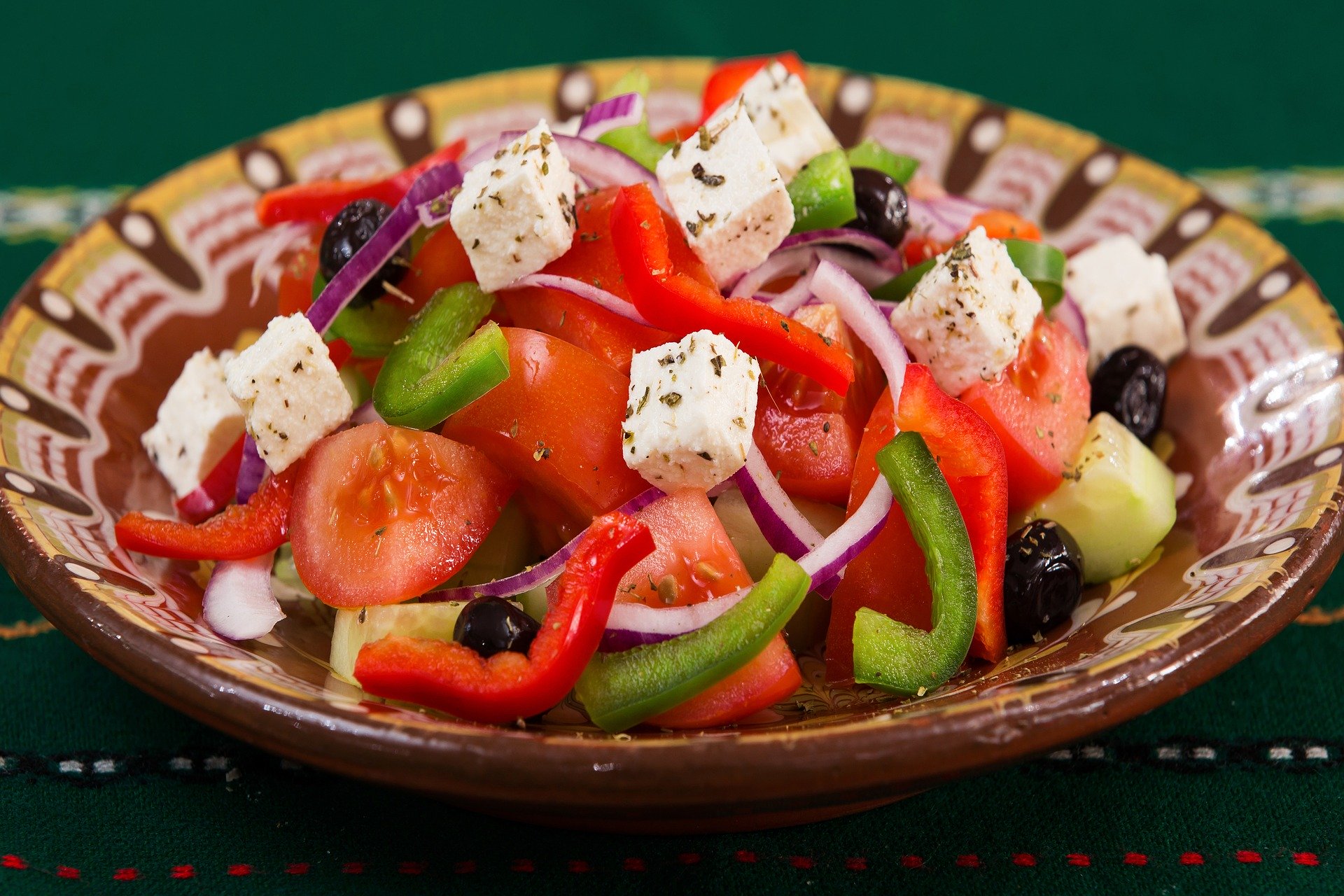
What is the Mediterranean Diet?
The “Mediterranean Diet” is an eating pattern that blends the basics of healthy eating with the traditional foods of Mediterranean countries, such as Greece, Italy, Turkey and the many other countries that border the Mediterranean Sea.
In the mid-1900s, researchers observed that there was a lower rate of death from heart disease in Mediterranean countries compared to the United States and northern Europe. There are many different Mediterranean countries with their own unique cultures and dishes so the Mediterranean Diet is flexible. Additionally, lifestyle factors such as physical activity also contribute to health and disease risk.
The Mediterranean Diet includes
| Daily | Vegetables, beans, fruits, potatoes, whole grains, nuts, seeds, healthy oils ( olive oil), herbs and spices |
| Weekly | Seafood and fatty fish 2x per week |
| Moderately | Dairy (milk, cheese, yogurt), poultry (chicken, turkey), eggs |
| Limited | Red meat, processed foods, sugary desserts, fast foods, saturated fats |
As you can see, the Mediterranean Diet is an example of plant-based eating with plants being the centerpiece of meals and snacks. Plant proteins provide nutritious key nutrients for health and immune function. Fish rich in omega-3 provide lean protein, as do small amounts of low-fat dairy, chicken and eggs. Healthy fats, such as olive oil, along with herbs and spices, help flavor the food.
Does the Mediterranean Diet include red wine?
The traditional Mediterranean Diet typically allows red wine in moderation. However, the Dietary Guidelines for Americans caution against beginning to drink or drinking more often on the basis of potential health benefits. Red wine is an optional not essential part of the Mediterranean Diet. If you do drink, limit consumption to no more than one drink per day for women and two drinks for men. One drink is defined as 12 ounces of beer, 5 ounces of wine or 1.5 ounces of liquor.
Alcoholic beverages are not recommended during cancer treatment due to potential drug interactions. Talk with your doctor about your consumption of any alcohol beverage, including wine.
Is the Mediterranean Diet a good eating plan to follow during cancer treatment?
Since the Mediterranean Diet includes a variety of plants, whole grains, unsaturated fats and protein, it can be a healthy eating plan to follow after a cancer diagnosis. However, you may need to make modifications if you experience side effects from treatment such as digestive issues, gas, difficulty chewing, intolerance of higher fat intake, or you are not able to consume adequate calories and protein on this menu to maintain a healthy weight and stay well-nourished.
Always talk with your healthcare team before changing your diet or eliminating foods.
Does the Mediterranean Diet decrease the risk of cancer?
The American Institute for Cancer Research (AICR) states that the evidence is too limited to make strong conclusions about the Mediterranean Diet specifically and cancer risk. However, the Mediterranean Diet does meet the recommendations for a plant-based eating style which can decrease the risk of cancer.
Additionally, the Mediterranean Diet includes lower-calorie foods, high-fiber foods and healthy fats that may reduce the risk of weight gain and obesity. Weight gain and obesity are risk factors for at least 12 different types of cancers.
How can I start following the Mediterranean Diet?
If your healthcare team agrees that the Mediterranean Diet is right for you, here are some tips to get you started:
- Add vegetables. Start with 1 cup at most meals and ½ cup at some snacks daily for a total of 3-4 cups per day. Add veggies to pasta, pizza, sandwiches, soups and smoothies!
- Enjoy at least two cups of fruit per day. Swap your typical dessert for mixed fruit bowls and yogurt parfaits.
- Choose whole-grain rice, quinoa, couscous, breads, wraps, bran cereals, oatmeal and pastas. Whole grains include more nutrients, phytochemicals and fiber than refined grains.
- Season your foods with herbs, oils and vegetables. Use olive oil for cooking and dressings. Add flavor with parsley, cumin, cinnamon, chives, peppercorns, garlic, onion, basil and/or lemon juice. You won’t need added salt as the flavors from the oil, herbs, seasonings and vegetables will be enough!
- Add proteins from legumes, seeds, nuts, fatty fish rich in Omega 3 fatty acids (salmon, albacore tuna, cod, sardines, and trout), eggs, poultry and low fat dairy. Include fish at least twice weekly. Fish can be the protein in casseroles, tacos, salads and sandwiches in place of processed or red meats. If you occasionally eat red meat, choose lean cuts and small 3-4 ounces portions. Avoid processed meats, which are meats that have been salted, cured or processed, such as bacon, sausage and hotdogs.
- Avoid processed snack foods, which often are higher in fat, sodium, added sugar and calories with fewer nutrients. Instead, at snack time, choose
- Fruit
- Whole-grain crackers and nut butter
- Greek or plain yogurt with chopped nuts
- Low-fat trail mix
- Hummus with vegetable sticks
Resources
American Institute for Cancer Research (AICR): Mediterranean Diet
Cancer Dietitian: Mediterranean Diet Resources
Food & Nutrition: How to Start the Mediterranean Diet

Thank you so much for introducing me to this concept I was never aware of this diet until I landed on this page, indeed it is a great content providing page, will surely share this with my friends and family as well.